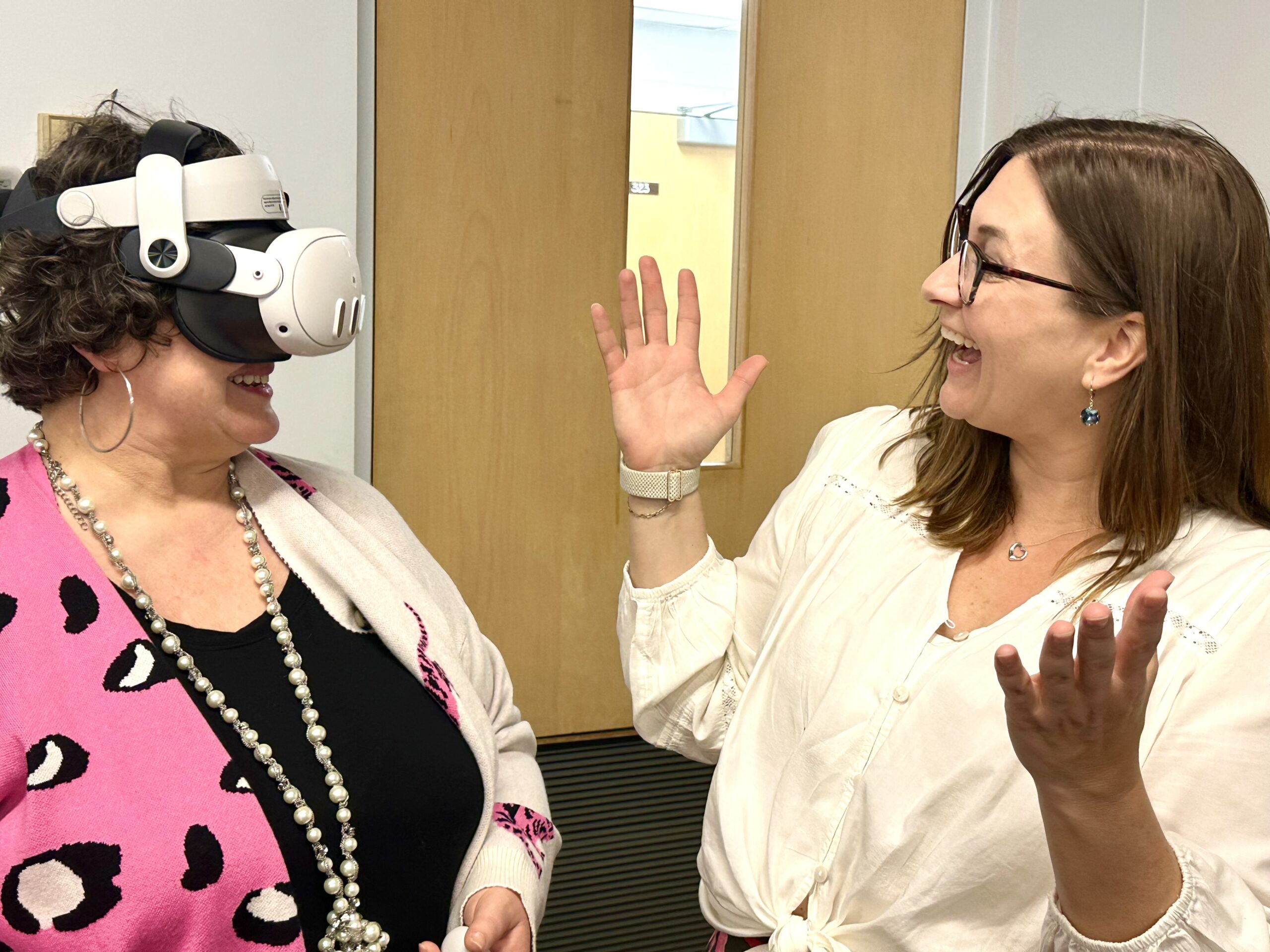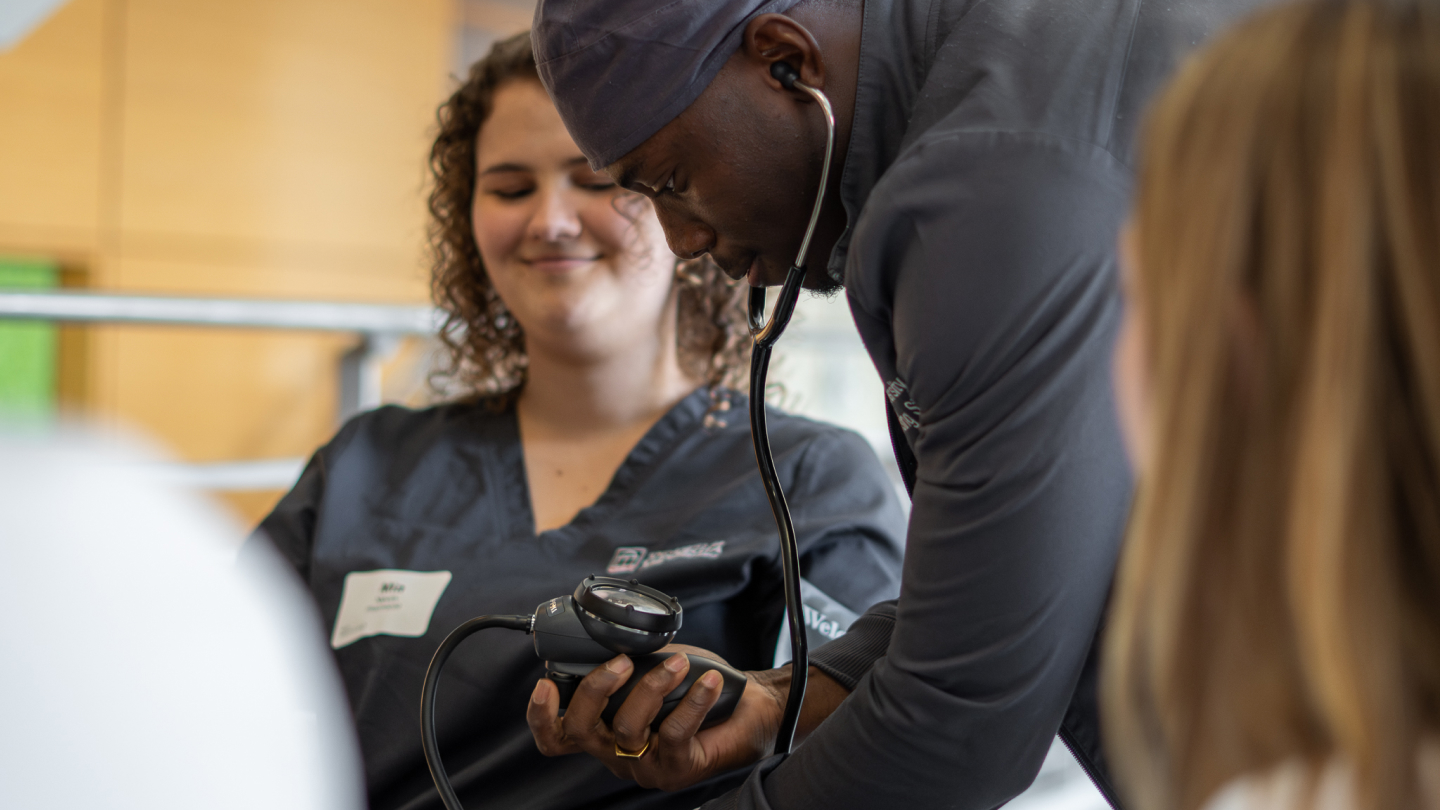Building strong relationships with patients and healthcare colleagues is vital in pharmacy practice. For students in UGA’s College of Pharmacy, this begins with simulated patient and client interactions woven throughout their classroom training. Ultimately, this equips students with the communication skills and confidence needed to deliver patient-centered care.
“Simulations evolve as students progress through their didactic education—from simple mock patient counseling sessions to large-scale, interprofessional interactions,” said Dr. Lori Duke, Assistant Dean for the College’s Experience Programs. “Most simulations involve actors who portray a patient’s physical and emotional status. These ‘patients’ may be asked to raise concerns about their medications or react in a certain way to information they received from a provider.”

CoP’s Communication Simulation Coordinator Dr. Jennifer Marks (l) participated in a recent onboarding and training for Augmented Reality (AR) Software (Holohuman) with GigXR representative Nichole Pullen. Use of this tool will reinforce student learning outside the classroom.
“With this commitment to patient-centered care, the College has stepped up its game with Dr. Jennifer Marks, who is the new Communication Simulation Coordinator for the Colleges of Pharmacy and Veterinary Medicine at UGA. Dr. Marks’s innovative joint appointment will expand the use of simulated patient and client experiences to advance communication training across multiple health platforms and professions. Dr. Marks, who earned her PhD in Theatre and Performance Studies at UGA, has been a driving force behind the growth of UGA’s simulation initiatives, which include pharmacy, the School of Medicine, veterinary medicine, social work, and more. Looking ahead, Dr. Marks plans to strengthen interprofessional education and prepare students for patient- and relationship-centered care.
“After graduating from UGA, our students enter their chosen profession practice-ready, not only with clinical knowledge, but with the communication skills essential for effective, compassionate care,” said Dr. Marks. “Simulation provides a safe, structured space to practice conversations that can be among the most difficult in a healthcare career.”
Trainings Take Place Every Year
In their first year of the PharmD program, students engage in multiple simulations to practice skills learned in the classroom. Students utilize the three prime questions from the Indian Health Services framework to counsel on a new prescription and later help a simulated patient resolve a medication adherence issue. In the spring, students counsel patients on appropriate medication for specific illnesses and conditions. Dr. Nick Castillo ‘24 recently joined the College as Community Practice Experience Coordinator. He will oversee the first-year simulations along with community-based Introductory Pharmacy Practice Experiences (IPPEs). “Our goal is to prepare students for real-world practice. Simulations offer a supportive space to practice clinical skills and receive feedback on professional development,” he said.
First-year simulations also focus on responding to public health emergencies through interprofessional teamwork. In the fall, students participate in a Point of Dispensing clinic to distribute antiviral medication during a simulated flu outbreak on the UGA campus. In the spring, students collaborate on a large-scale public health simulation, responding to a Giardia outbreak in a rural community. Pharmacy students work on collaborative teams with other students training to be nurse practitioners and clinical nurse leaders from Augusta University’s nursing program; epidemiology students from the UGA College of Public Health; and student medical interpreters from the UGA Department of Romance Languages. These student practitioners also parallel the real-life practice of assisting public health officials in tracking the disease outbreak and mounting an intervention to minimize its spread. Student teams learn about each profession’s training, negotiate patient-care roles, and implement an evidence-based plan of care. Now a second-year student, Reeya Kabira reflected, “This experience helped me see the value of interprofessional collaboration. Every team member contributes unique skills, which ultimately leads to better health outcomes.”
In the second year, simulations expand in scope and complexity, with pharmacy students collaborating with second year Doctor of Veterinary Medicine students to provide care for Cowboy, a dog with a suspicious owner. The event starts with student healthcare teams viewing a veterinary office visit and culminates when Cowboy and his owner arrive at a compounding pharmacy to receive medication. This longitudinal experience spans three months and allows students to establish and build trust with their teammates, while increasing their awareness of the value of both professions when caring for animals and their owners.
According to Dr. Timothy Brown, Director of Interprofessional Education (IPE) at the College of Pharmacy and Director of Interprofessional Collaboration at UGA’s School of Medicine, the program is always evolving. “College of Pharmacy faculty members have spearheaded initiatives to expand access to immersive experiences, such as an IPE simulation elective,” he said. “This elective challenges students to lead as the sole pharmacist on a team, fostering autonomy and confidence through real-world scenarios. Starting this training early allows students to see how they fit into a healthcare team. Research shows that teams optimize care, and when pharmacists are part of that team, outcomes improve.”
Third year students build on these skills with increasingly intricate interprofessional experiences involving multiple healthcare professions. Pharmacy students collaborate with medical students, social work undergraduate and graduate students, and senior nurse practitioner students to manage a virtual patient through complex healthcare scenarios. The focus is on critical thinking, ethical decision-making, and understanding the unique perspectives of each profession. Commented Brantley Hughes, now a fourth-year student, “Having the opportunity to participate in our IPE event gave me a new sense of confidence in my role as a pharmacist. Working alongside multiple professions showed me what I can bring to a healthcare team and how essential collaboration is for quality patient care.”
The long-term impact of these experiences is clear: Through simulations, students ultimately gain an inherent ability to make informed decisions and provide compassionate care, which leads to enhanced and improved outcomes for those they serve.
